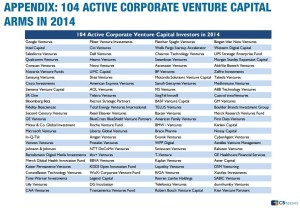The most common measure of corporate R&D is through BERD spending. And on that metric, Canadian companies are a rather uninspiring bunch. However I/we have increasingly wondered whether we’re perhaps missing part of the R&D picture. In particular, is it possible that direct investments into startups are displacing traditional R&D funding? And if so, is it possible that these investments might not show up in our data?
Answering this requires some pretty granular data on corporate investment that seems quite difficult to find in Canada. For example, only a handful of formal corporate venture funds seem active in Canada. Our scan highlights the following:
– BlackBerry Partners Fund
– Cenovus Environmental Opportunity Fund
– Enbridge Technology Ventures
– OpenText Enterprise Venture Fund
– Rogers Venture Partners
– Telus Ventures
And within those the volume of deals is unknown.
We know, however, that there’s more action.
For example, Power Financial recently put $10million (with an option for an additional $20million) into WealthSimple. Magna invested a few dollars in U.S. connected car startup Zubie. BCE invested $5million into Hubub. And others like Suncor have invested through third-party funds like Emerald Technology Ventures or GlaskoSmith Kline through their Life Sciences Innovation Fund
As well, companies including BMO Financial Group, Canadian Imperial Bank of Commerce, National Bank of Canada, RBC Royal Bank of Canada, Scotiabank, TD Bank Group, Manulife and OpenText Corporation have each invested into the Northleaf Venture Catalyst Fund (NVCF). NVCF is the first fund of funds to be established under the Government of Canada’s Venture Capital Action Plan (VCAP). Individual corporate contributions were maxed at $50 million per corporate contributor.
Add up those amounts and we’re still looking at a pretty small aggregate amount of investment. That can’t be it, can it? Who am I missing?
Contrast this to what we see in the U.S. Analysis by CB Insights shows 104 active corporate ventures funds in 2014, up from just 10 in 2010. These corporate venture funds participated in 656 deals totalling USD12.31 billion in 2014. And they invested in 18% of all U.S. VC deals (over 3,600 of them total). Broken down by sector, these investments include USD2.6 BN in 119 mobile/telecom deals and USD2 BN into 104 healthcare deals.
The most active corporate funds are Google Ventures, Intel Capital, Salesforce, Qualcomm, Comcast, Novartis, Samsung, Cisco, Siemens, SR One and Bloomberg. A full list of these 104 US CVCs is available below courtesy CB insights.
In theory, many of these organizations are trying to reinvent themselves, atleast in part, through the integration of or competition with disruptive and challenging startup business models. This is part of Salim Ismail’s exponential organization thesis.
So does Canada simply lack such leading fi rms? Or do the 10+ firms listed above represent a relatively equal sample once you’ve accounted for the significant difference in the sizes of the two economies?
rms? Or do the 10+ firms listed above represent a relatively equal sample once you’ve accounted for the significant difference in the sizes of the two economies?
Ultimately if the number and size of corporate deals is as limited as it looks like, this goes a ways in explaining the dearth of capital available to firms at different stages of growth in Canada. And it puts more pressure on Canadian pension funds and corporations to get into the game.